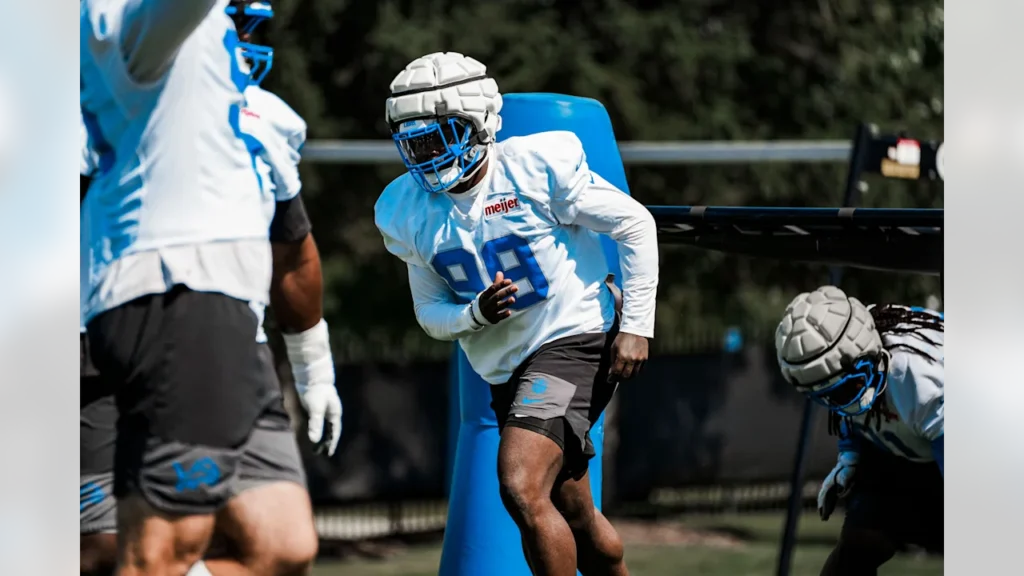📸 Image Credit: Detroit Lions
The Detroit Lions are entering today’s home game with high expectations, and fans across Michigan are ready to roar inside Ford Field. Playing at home in the NFL isn’t just about location—it’s about energy, confidence, and momentum. For the Lions, who are steadily climbing into contender status, their home-field edge could prove to be one of the biggest factors in today’s matchup.
So, how exactly does a Detroit home game benefit the team? Let’s break it down.
The Ford Field Factor
Located in the heart of downtown Detroit, Ford Field is more than just a stadium—it’s a fortress. With a capacity of over 65,000 fans, it creates one of the loudest indoor atmospheres in the NFL.
- Noise Disruption: Opposing quarterbacks often struggle with snap counts and communication due to the deafening crowd.
- Comfort for the Lions: Detroit’s players are accustomed to the turf, locker rooms, and overall conditions, which reduces distractions.
- Fan Passion: After years of rebuilding, the Lions’ faithful are hungrier than ever, turning Ford Field into one of the most intimidating places to play.
Why Home Games Matter in the NFL
Across the league, statistics show that teams win more often at home than on the road. The Lions are no different. Here’s why:
- Travel Fatigue for Opponents – Visiting teams deal with flights, hotel stays, and unfamiliar routines.
- Crowd Energy – A hyped-up crowd can swing momentum with a single big play.
- Familiar Game Flow – Coaches and players are more comfortable calling plays in their home stadium.
- Psychological Boost – There’s an extra level of pride when defending home turf.
Detroit Lions: Momentum at Home
The Lions’ recent resurgence has transformed the perception of Detroit football. With young stars on both sides of the ball, they’ve turned Ford Field into a place where fans genuinely expect victories.
Offensive Confidence
Quarterback Jared Goff has looked more comfortable at home, often benefitting from quieter communication on offense compared to hostile road environments. The offensive line also thrives when not dealing with constant silent counts.
Defensive Intensity
Defensive players like Aidan Hutchinson feed off the energy of the crowd. When the fans get loud on third down, it creates chaos for opposing offenses and gives Detroit’s pass rushers an extra edge.
Detroit Lions Home Game Benefits
Lions Home-Field Advantage Breakdown
| Advantage | Impact |
|---|---|
| Loud Ford Field Atmosphere | Disrupts visiting teams’ play-calling and communication |
| Fan Support | Boosts player energy and confidence during key moments |
| Comfort & Familiarity | Players adapt better to their own facilities and conditions |
| Reduced Travel Stress | Keeps Lions fresh compared to road-weary opponents |
Key Players Who Shine at Home
- Jared Goff (QB) – Better rhythm and fewer communication errors under center.
- Aidan Hutchinson (DE) – Uses crowd noise to fuel his relentless pass rush.
- Amon-Ra St. Brown (WR) – Thrives with crowd energy, often making clutch plays.
- David Montgomery & Jahmyr Gibbs (RBs) – Run game tends to look stronger with home blocking advantage.
Fan Perspective
For Detroit fans, a home game is more than just football—it’s community pride. Generations of fans have supported the Lions through ups and downs, and the current winning momentum has created an electric bond between team and city.
Tailgates outside Ford Field turn the entire neighborhood into a sea of Honolulu Blue, building hype before kickoff. Inside, the “Defend the Den” mentality keeps the energy alive throughout the game.
Final Thoughts
Today’s Detroit Lions home game is about more than just another regular-season matchup—it’s about using Ford Field as a weapon. The crowd, the comfort, and the pride of playing in Detroit give the Lions a unique edge that could push them closer to another statement win.
For opponents, stepping into Ford Field means facing not just 11 players, but an entire city united behind its team.
If the Lions continue to leverage their home advantage, they’ll strengthen their playoff push and make Detroit one of the toughest places to play in the NFL.

